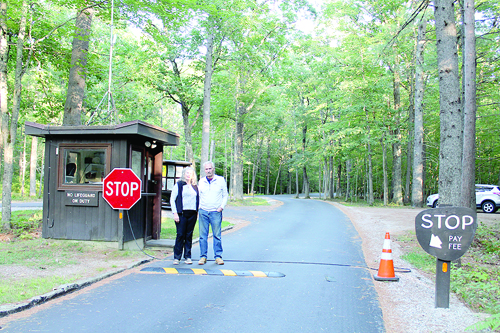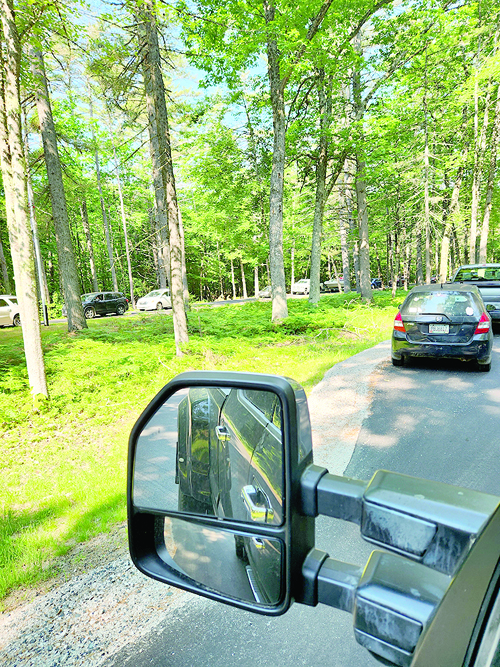Families file suit against two state departments

By Dawn De Busk
Staff Writer
CASCO — Every day, Laurie Mason walks through Sebago Lake State Park. She refers to the woods and the water as “a magical place.”
She and her husband Bob Mason own the lot adjacent to the east end of the day-use area. Her uncle once had a hunting lodge there and several cottages that have since been moved.
“We were actually here before the state park was developed. We have been here longer than the state park has been in existence,” Laurie said.
Over the years — on the hottest days during the height of the summer, the long line of vehicles waiting to get into the park has delayed the Masons from going to their home. In fact, the line of vehicles often ends up parked on State Park Road all the way to the green bridge that spans the Songo River.
“During the past couple years, it has been very difficult for us to get through to our homes,” Laurie explained. “There have been problems for our families. There have been problems for our contractors. People have had plumbing problems, septic issues, dangerous trees that need to be removed, things like that. Their contractors couldn’t get through the line so they turned around and they left.”
Bob added, “If you had an emergency like a heart attack even an ambulance would have a hard time getting through.”

Recently, the park system received federal funds from the American Rescue Plan Act (ARPA) to upgrade the parks which were heavily used during the Pandemic. The plan is to move the fee-collection booth about a mile down the road to give the vehicles more space to queue up.
It is not the solution that the Masons think will work.
Two weeks ago, the Masons along with eight other families whose land abuts the park filed a lawsuit against the state park with Maine Superior Court. Essentially, the lawsuit is being filed against the State of Maine Bureau of Parks and Lands, Department of Agriculture Conservation and Forestry.
“If I didn’t file a lawsuit, I would give up my access rights. I’m not going to do that,” Bob said. “That is the reason for the lawsuit plus the pollution caused by hundreds of idling vehicles. To me, to have 400 cars or 300 cars sitting there idling is absolutely insane.”
The Masons initiated the lawsuit, gathering the support of the other families who rely on the road for access to their homes.
The couple explained the flaw in the method for collecting the park fee. There are ways that would reduce the amount of time people wait in line while vehicles are left running to keep the occupants air conditioned, they said.
Bob offered up a couple ideas for the problem.
Moving the fee-collection station “will bring the cars inside the park. But they’ll still be sitting there idling for hours. They (the state) is saying their booth will correct that and I don’t see that happening. The biggest problem here is the pollution side of it — you have 400 cars sitting there idling. That is something that could be easily corrected. They could put a system like EasyPass in. They could collect the fee on the way out because everyone doesn’t leave at the same time, which would cut way back on that problem,” he said.
Laurie mentioned another drawback.
“Also, they are putting in a new collection booth. It is going to have three lanes in it. Part of the problem is: It still has to be staffed. They always have an issue with staffing. We are concerned it is going to be backed up although they are saying it will work. Our concern is that we still going to have the issues of people waiting in line for hours and hours,” she said.
In the lawsuit, a state statute is cited. Maine lawmakers passed a law prohibiting commercial vehicles from idling and contributing to air pollution.
“In Maine, they passed a law on commercial vehicles idling but they didn’t do it for on passenger vehicles,” Bob explained.
Hopefully, the legislature will look at that topic and consider making another law to discourage non-commercial vehicles from idling for long periods of time, he said.
“One of the reasons they moved this into the park is the line of vehicles was out on State Park Road, which is dangerous. If you had twice as many cars, they would still be out in the road,” Bob said.
Laurie Mason stressed that the goal of the lawsuit is not to prevent that upgrade, but instead to consider other methods for collecting park fees that will expedite that amount of time vehicles are parked in line and reduce the carbon dioxide emissions.
“We are not trying to stop the state from doing this. They are getting a big grant from the government. This state park needs to be taken care of. There hasn’t been any money available for this park for a long, long time. The improvements that could be done here with that money — we are all for it. We are just saying, ‘Let’s do it the right way.’ This is once-in-a-lifetime chance probably for the state park. If they are going to make this kind of investment in this park, let’s do it so it works correctly and it works for the future, it works for the families living here, it works for the citizens, it works for the environment,” Laurie said.
The couple commented that the number of people using the park has increased tenfold in just a few years.
“From the first of July until the end of August, it’s busy. In July, when we had that blazing heat, every day was busy with lines of vehicles,” she said. “Everyone wants to be in the water. Who could blame them?”
“We are not trying to stir up trouble. We just want people to know what is going on here. Most people, if they live in this area, and they’ve tried to come in the park on one of those days, they know exactly what I’m talking about,” Laurie said. “We care about it. I love this place. It is my home. I care about what is happening.”


